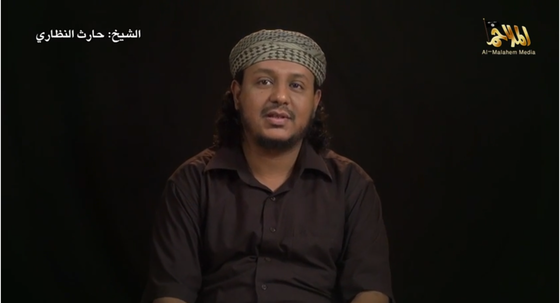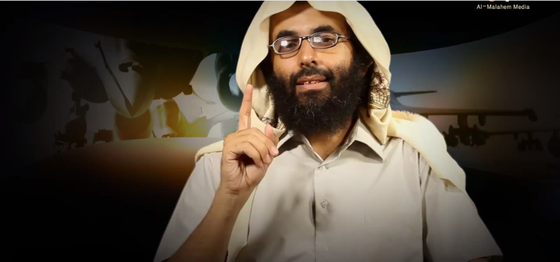Two top al Qaeda in the Arabian Peninsula (AQAP) ideologues have released videos in recent weeks portraying the ongoing US-led bombing campaign in Iraq and Syria as part of a “Crusader” war against Islam.
Both AQAP officials preach unity against the West without explicitly mentioning, let alone praising, the Islamic State. Indeed, in one of the videos, AQAP implicitly criticizes the Islamic State’s declared caliphate.
The messaging in the pair of videos is consistent with earlier statements made by al Qaeda’s international network. [See LWJ reports: Al Qaeda branches urge jihadist unity against US and Al Qaeda portrays US-led bombing campaign as ‘Crusade’ against Islam.]
In a video released on Oct. 23, an AQAP official named Harith bin Ghazi al Nadhari criticizes the Islamic State’s approach to declaring a caliphate. Nadhari does not mention the Islamic State, but part of his video is clearly aimed in its direction.
Nadhari begins by drawing a distinction between two positions of authority within the Islamic world, with one being a “general position of command, such as the caliphate,” and the other being a “special command position” over specific “Islamic groups.”
“No one group can encompass the entire ummah, or worldwide community of Muslims, while also claiming that “everyone else is not part of it,” Nadhari says.
Nadhari denounces Kharijites, an early group of Muslims that labeled their co-religionists apostates, because they “always deem the sinful to be an infidel.” Nadhari says that even Shiites, who are “sinful,” are “not infidels” and are part of the ummah.
Later in the video, Nadhari explains that Muslims should not claim that others are apostates without proof.
Tellingly, Nadhari also says that it is a “big mistake” for Muslims to give their “loyalty” to “organizations, factions or states,” as a Muslim’s allegiance is owed to Islam alone. (Al Qaeda’s leaders often, but not always, require a bayat, or oath of loyalty, from subordinates. It is not clear how Nadhari would resolve the logical tension between his argument and al Qaeda’s own practices.)
The AQAP ideologues’ teachings are certainly made in reference to the Islamic State. Some of the online jihadists who retweeted the video commented that Nadhari was criticizing Abu Bakr al Baghdadi’s group. Baghdadi has unilaterally declared himself to be the caliph and the Islamic State to be a caliphate. The organization and its supporters argue that all other Muslims and jihadists owe their fealty to Baghdadi alone. And the Islamic State’s leaders frequently accuse others of being infidels for simply disagreeing with them.
In fact, the Islamic State’s jihadist critics have frequently labeled it a Kharijite organization. Neither Nadhari, nor AQAP in general, has gone this far, but Nadhari’s lecture evokes this comparison.
Despite the disagreements within the ummah, Nadhari says, all Muslims still owe their loyalty to the community of believers. “Muslims are an ummah that is seperate from infidels, but mujahideen are not an ummah separate from Muslims,” the AQAP leader says. Muslims sometimes “oppress one another,” but the Islamic “brotherhood” remains unbroken.
Nadhari cites Ibn Taymiyyah, an Islamic theologian who lived in the 13th and 14th centuries, to buttress his points. And he says the prophet’s followers warred “with each other,” but remained “loyal to each other and accepted each others’ testimonies.”
Thus, Nadhari’s video, which is marketed as a lecture, is intended to explain why Muslims, including rival jihadist organizations, must remain unified in one ummah despite their problems.
Nadhari claims that “all these differences and disagreements are,” in the end, “nothing.”
Earlier video featured Ibrahim Rubaish, an ex-Guantanamo detainee turned AQAP theologian
|
Ibrahim Rubaish, an ex-Guantanamo detainee turned AQAP theologian, has denounced the “Crusader” campaign in Iraq and Syria. |
An earlier video, released on Oct. 19, features Ibrahim Rubaish, an ex-Guantanamo detainee who is one of AQAP’s chief ideologues.
“We witness these days a Zionist-Crusader campaign against our brothers in Iraq and al Sham [Syria],” Rubaish says. “The servants of the White House have mobilized for this campaign,” Rubaish adds, but the US and its allies “have said, emphasized, and repeated that they will not descend to the ground [i.e. send in ground forces] – and this is due to the bitterness of what they tasted in their past experience in Iraq and Afghanistan.”
Rubaish claims that the war against the jihadists in Iraq and Syria cannot be won as long as the US-led coalition refrains from entering a ground war. But if the coalition does expand the campaign, then it risks an even greater loss. “If the Crusaders and their tails stay in the air,” Rubaish says, “they will not resolve [to win] the battle. And if they recklessly descend, their catastrophe will repeat, by the grace of Allah.”
Rubaish criticizes the Muslim-majority countries that joined the West in the air war against the Islamic State and other jihadists. Muslims “must be aware that America and whoever is behind her have not come to preserve their sanctity and blood, as they claim,” Rubaish says. “The Nusayri regime [a derogatory reference to Bashar al Assad’s government] is still, as it has been doing for years, killing Muslims, violating their honor, and the world watches and does nothing,” Rubaish explains. “And America has come instead to fight the implementation of Allah’s law….”
Saudi Arabia, in particular, draws Rubaish’s ire. The AQAP ideologue is a Saudi and was placed in the kingdom’s rehabilitation program for jihadists after his release from Guantanamo. He has repeatedly criticized the Saudis in AQAP videos and statements.
“This crusader campaign is not new, but what is new this time is the increased insolence of the agents of the Crusaders,” Rubaish says. The Saudis and other coalition partners are the West’s “agents,” according to the AQAP ideologue, and they are no longer ashamed of serving this role. Saudi Arabia “hosted a conference in Jeddah in order to orchestrate a war on Islam from the vicinity of the sacred House of Allah. It did not suffice with that, it even participated in the bombardment of Muslims with its airplanes.”
He claims that the Saudis are only willing to use military force against Sunnis in Iraq and Syria, and not against the Jews, the Shiite forces in Syria, or the Houthis (Shiite rebels operating along the Saudi border with Yemen). “These events indicate to us that the Saudi forces were created, rather, to combat Islam,” Rubaish argues.
“In conclusion, I call on every Muslim to have a position against this Crusader campaign…a position that proves his loyalty to the Muslims,” Rubaish says. “Whoever is able to – let him wage jihad with his self and property. Whoever is incapable – [let him wage jihad] with his tongue….”
Defended “slander” of jihadist elders
Some have claimed that AQAP’s statements have favored the Islamic State in its rivalry with al Qaeda, but this is not the meaning behind AQAP’s messaging. The group has consistently preached jihadist unity in Syria, arguing that the infighting compromises their shared goals.
Moreover, in July, Rubaish and Nadhari were jointly featured in an AQAP video defending unnamed jihadist scholars and leaders against “slander.” The pair described the jihadist elders who had been tarred in terms that could easily apply to Ayman al Zawahiri, the head of al Qaeda, as well as others who have criticized the Islamic State.
The video from Rubaish and Nadhari also coincided with a poem from Nasir al Wuhayshi, who is both the emir of AQAP and al Qaeda’s general manager. Wuhayshi heaped praise on Zawahiri, describing him as the “sheikh father” of the mujahideen. [See LWJ report, AQAP praises Ayman al Zawahiri, defends jihadist scholars against ‘slander’.]









